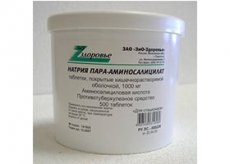Medical expert of the article
New publications
Preparations
Sodium para-aminosalicylate
Last reviewed: 03.07.2025

All iLive content is medically reviewed or fact checked to ensure as much factual accuracy as possible.
We have strict sourcing guidelines and only link to reputable media sites, academic research institutions and, whenever possible, medically peer reviewed studies. Note that the numbers in parentheses ([1], [2], etc.) are clickable links to these studies.
If you feel that any of our content is inaccurate, out-of-date, or otherwise questionable, please select it and press Ctrl + Enter.

Pharmacodynamics
The drug is a competitor of PABA in the fight for the active center of the enzyme that converts PABA into DHF, and in addition, it slows down the binding of folic acid inside bacterial cells. The tuberculostatic effect of the drug is weaker than the similar effect of streptomycin and isoniazid. The drug effectively affects Mycobacterium tuberculosis - it has a bacteriostatic effect (the size of the MIC in vitro is 1-5 μg / ml).
The drug reduces the risk of bacterial resistance to isoniazid with streptomycin. Its mechanism of action is due to the suppression of folic acid binding processes, as well as the formation of mycobactin (an element of the microbial wall), resulting in a decrease in the level of iron capture by the Mycobacterium tuberculosis bacterium.
It also affects mycobacteria that are in the stage of active reproduction, but has almost no effect on mycobacteria that are in a dormant state. The drug has a rather weak effect on intracellular pathogenic bacteria. The drug has no effect on other non-tuberculous mycobacteria.
Pharmacokinetics
After oral administration, it is absorbed fairly quickly. The maximum value after oral administration of 4 g of the drug is 75 mcg/ml.
It undergoes hepatic metabolism and is excreted by glomerular filtration – 80% with urine (more than 50% of the substance is in the form of an acetylated derivative). The substance passes into the cerebrospinal fluid only in the case of inflammation in the meninges.
Dosing and administration
The drug is taken orally with water. It should be taken after meals. The daily dose for adults is 9-12 g (3-4 g three times a day). Exhausted patients (weight less than 50 kg) or those who have poor tolerance to the drug, need to take 6 g / day. The dose for children is 0.2 g / kg / day, the dose is taken in 3-4 doses (a maximum of 10 g is allowed per day).
Persons undergoing outpatient treatment are allowed to take the entire daily dose at one time, but if a person has poor tolerance, it is necessary to divide the dose into 2-3 uses.
Use Para-aminosalicylate sodium during pregnancy
Pregnant women can take the drug only in cases where the possible benefit from treatment exceeds the likelihood of complications and the fetus.
Breastfeeding is prohibited during therapy.
Contraindications
Side effects Para-aminosalicylate sodium
The use of drugs may lead to the following side effects:
- damage to the gastrointestinal tract: the appearance of vomiting with nausea, loss or weakening of appetite, diarrhea or constipation and abdominal pain;
- allergy symptoms: fever, bronchial spasms, enanthem, and also dermatitis in the form of purpura or urticaria;
- Others: joint pain, development of eosinophilia. Rarely, thrombocytopenia or leukopenia or agranulocytosis occurs, and in addition, drug-induced hepatitis or crystalluria develops.
After prolonged use of high doses of drugs, goiter or myxedema may develop.
Interactions with other drugs
The drug increases the isoniazid levels in the blood, interferes with the absorption of erythromycin, rifampicin, and lincomycin, as well as the absorption of cyanocobalamin (this can lead to anemia). The drug also potentiates the properties of indirect anticoagulants (derivatives of indandione or coumarin).
Antacids do not affect the absorption of sodium para-aminosalicylate.
Storage conditions
The medicine Sodium para-aminosalicylate should be kept in a dark place, protected from moisture. Temperature values are no more than 25°C.
 [ 35 ]
[ 35 ]
Attention!
To simplify the perception of information, this instruction for use of the drug "Sodium para-aminosalicylate" translated and presented in a special form on the basis of the official instructions for medical use of the drug. Before use read the annotation that came directly to medicines.
Description provided for informational purposes and is not a guide to self-healing. The need for this drug, the purpose of the treatment regimen, methods and dose of the drug is determined solely by the attending physician. Self-medication is dangerous for your health.

